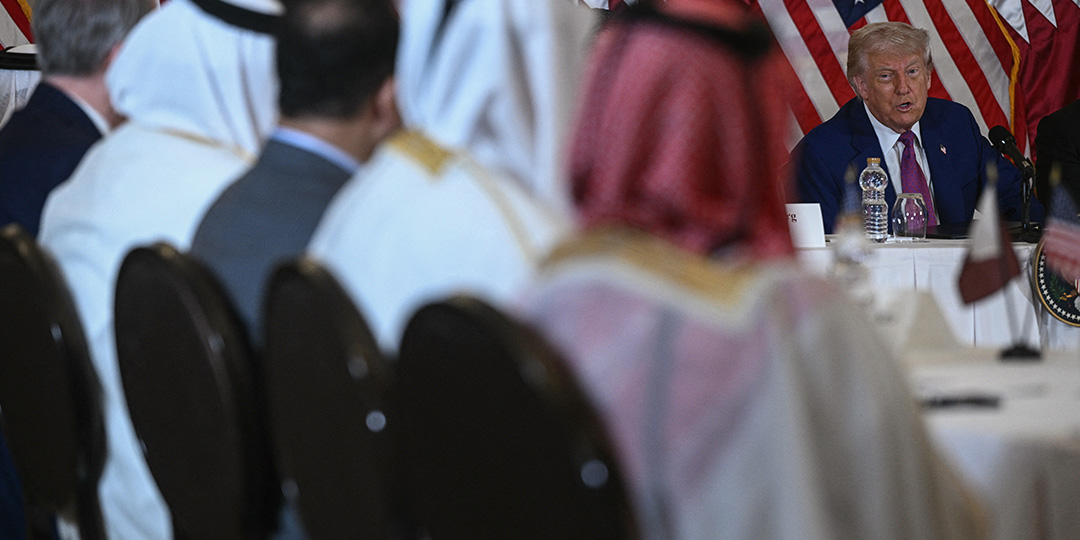US President Donald Trump signed an executive order this week vowing to defend Qatar against attacks, following Israeli air strikes targeting Hamas leaders in Doha.
The security assurance from Washington is unprecedented for an Arab ally and is seen as both a boon for key Gaza mediator Qatar and a rebuke to Israel.
Here we unpick what it means for Qatar, the Gulf and Israel:
– What did Trump promise? –
The order says “the United States shall regard any armed attack on… Qatar as a threat to the peace and security of the United States”.
It says the US will take “all lawful and appropriate measures — including diplomatic, economic, and, if necessary, military — to defend the interests of the United States and of the state of Qatar” if it is attacked.
For Andreas Krieg, a senior lecturer at King’s College London, the directive “turns attacks on Doha into problems for Washington”.
“For the region, it restores a measure of deterrence but leaves the United States with ample discretion over how to act,” he added.
Elizabeth Dent, a senior fellow at the Washington Institute think-tank, noted that executive orders, unlike Senate-ratified treaties, are non-binding and can be overturned.
“While the language is much stronger than anything we’ve seen for Qatar (and frankly most countries in the Middle East)… it is largely unenforceable and likely intentionally vague,” said Dent, a former director for the Gulf and Arabian Peninsula in the Office of the US Secretary of Defense.
– What does it mean for Qatar and Israel? –
Qatar is a key US ally that hosts the region’s largest American military base, Al-Udeid, and its leadership is close to Trump.
It has been attacked twice recently — first in June, when Iran targeted Al-Udeid, and then last month when Israeli strikes targeting Hamas leaders killed six people including a Qatari security officer.
The latest attack triggered outrage from Qatar and its Gulf neighbours, which lean heavily on the United States to preserve their security.
Trump’s order has given Qatar “a major diplomatic and strategic win”, said Dent, adding that “it also signals the value the US places on Qatar’s role as a diplomatic negotiator”.
The same day the order was signed, Trump held a three-way call where Israeli Prime Minister Benjamin Netanyahu expressed regret to Qatari Prime Minister Sheikh Mohammed bin Abdulrahman Al Thani and promised no further strikes.
Qatar then resumed its mediation role in the Gaza war and Trump announced a new plan for the Palestinian territory, which Hamas officials are currently reviewing.
The security guarantee reinforces Qatar’s “unique position in the region”, Dent said, referring to its mediation with US foes including Hamas, Iran and the Taliban government in Afghanistan.
For Israel, which has attacked Lebanon, Iran and Yemen largely unimpeded during the Gaza war, it is “both a strategic and symbolic loss”, Dent said.
Krieg said that any future attack in Qatar “would carry a higher risk of serious American response”.
Still, the wording of the order allows for flexibility in the way the US would respond, especially in a scenario where Israel asks its ally for permission to try again.
“Would President Trump have requested the same amount of grovelling had the strike successfully taken out its intended targets?” Dent said.
– How will other Gulf countries react? –
Under former US president Joe Biden, Washington dangled the promise of a security package for regional heavyweight Saudi Arabia in exchange for establishing ties with Israel.
Those negotiations came to a halt soon after Israel launched its assault against Hamas in retaliation for its October 7, 2023 attack.
Nearly two years later, Saudi Arabia has sought to diversify its security options, and last month it signed a mutual defence agreement with nuclear-armed Pakistan.
The United Arab Emirates, another US ally in the Gulf, recognised Israel under the Abraham Accords of 2020.
But it lacks similar security guarantees to the one offered to Qatar, and the sale of American F-35 stealth fighters, announced after the Abraham Accords, has never been finalised.
Trump’s security pledge makes Qatar a “balancing power in the region”, said Dent, “one that the US at least appears more formally interested in protecting”.
Krieg said: “For the wider Gulf it raises the bar. Other states will now be tempted to seek similar assurances, or else accelerate their own hedging strategies and regional defence arrangements.”
bur-aya/th/js/ser
© Agence France-Presse







